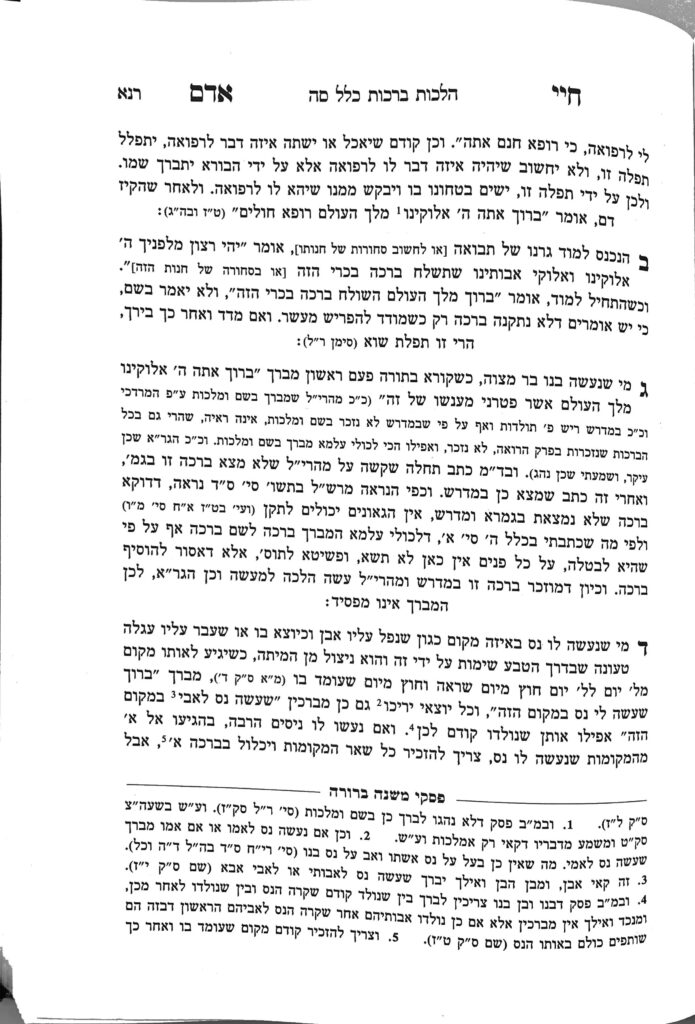We are continuing in siman 3, discussing the bracha of baruch shepitrani. We expanded the discussion to learn about whether brachos which are not mentioned in the Gemara can be instituted later on by the Geonim and Rishonim.
The Chayei Adam references Klal 5. One who mentions Hashem’s name for no purpose transgresses the mitzvas asei deoraysa of es Hashem elokecha tirah, because it is lack of yirah to throw around someone’s name. A bracha levatala is worse, because one also transgresses the issur of lo sisa. (the Chayei Adam use the phrase bracha sheaina tzricha to refer to bracha levatala)
Tosfos understand that a bracha levatala is an issur derabanan, and the Gemara’s quotation of the pasuk of lo sisa is only an asmachta (a torah source upon which Chazal upended their enactment, but is not actually a mitzvah or issur deoraysa). According to Tosfos, on a deoraysa level, if one recites a bracha as praise to Hashem, even if it is unnecessary from a halachic standpoint, there is no issur involved. On a derabanan level, Chazal enacted an issur of bracha levatala..
However, the Rambam holds that the issur of bracha levatala is an issur deoraysa. The Magen Avrhaam, at the end of siman 216, grapples if the Rambam holds that a bracha levatala is really deoraysa. It can be argued, as Tosfos argued above, that if one is reciting a praise to Hashem, even if it is halachically unnecessary, it should not create an issur deoraysa.
The Chayei Adam paskens like Tosfos and the Magen Avraham, and writes that if one recites a bracha which they are not obligated to recite, they are not transgressing any issur deoraysa. The Chayei Adam writes that this reason is part of the argument why women can recite a bracha on a mitzvah in which they are not obligated but wish to perform anyways. Since they are praising Hashem when reciting the bracha, it cannot be that there is an issur deoraysa involved. (The other part of the argument is that when we say vetzivanu in a bracha, it does not refer to the individual reciting the bracha [which would be false regarding a woman], but it refers to Klal Yisroel as a whole.)
The Rambam argues, as we learned above, and holds that an unnecessary bracha is assur on a Torah level. The Sephardim follow the opinion of the Rambam, and therefore a Sephardi woman does not recite a bracha on a mitzvah in which she is not obligated.
As the Chayei Adam follows the opinion of Tosfos, and not the Rambam, there is no issue of an issur deorasya. However, as mentioned above, Chazal enacted an issur derabanan. This issur derabanan of bracha levatala should include an issur against creating new brachos which do not have a source in the Gemara. Regarding this issue, the Chayei Adam writes, as we learned previously, that he relies on the psak of the Maharshal (shiur 1245) that as long as there is a source somewhere in Chazal, even if it is not a Gemara, one may recite the bracha in question.
On the other hand, the Chayei Adam points out that, even with the above thought process, the Rema still wrote not to recite the bracha of baruch shepitrani..
Therefore, the final opinion of the Chayei Adam is that if one makes the bracha, they do not lose out, but they are not mechuyav to recite it.
The Mishnah Berurah, in siman 225:28, quotes the Rema, writes that the opinion of the Gra is that one can recite the bracha, and ends that the Chayei Adam holds one does not lose out by reciting it. From the language of the Mishnah Berurah, it appears that he holds that a person is not obligated in this bracha, but may recite the bracha with Hashem’s name if they wish.
Summary
- There is a machlokes whether brachos which are not found in the Gemara can later be established as bona fide brachos or not.
- Even if there is no obligation to recite the bracha, because there is no source in the Gemara, there is no issur deoraysa involved in reciting it, since it is a praise to Hashem. There may still be an issur derabanan, but the issur derabanan is addressed when the bracha has a secondary source (e.g., Midrash),
- Thus, for example, the Chayei Adam writes that one does not lose out by reciting baruch shepitrani with Hashem’s name.
- Even if the bracha does not have a source in Chazal, if the minhag has become to recite it, we recite it. Thus, for example, we recite the bracha of hanosein la’yaeif koach, even though there is no source in Chazal for the bracha.
- Even if there is no obligation to recite the bracha, because there is no source in the Gemara, there is no issur deoraysa involved in reciting it, since it is a praise to Hashem. There may still be an issur derabanan, but the issur derabanan is addressed when the bracha has a secondary source (e.g., Midrash),



